
by Shashikanth Heerekar | Jan 31, 2026 | Digital Marketing, SEO News
Discover the top web designing companies in Hyderabad offering website design, development, SEO, digital marketing, PPC, and branding solutions for business growth.
Introduction
Hyderabad has become one of India’s fastest-growing digital and technology-driven cities, making it a preferred destination for businesses seeking professional web design and digital marketing services.
With a strong ecosystem of IT talent, creative professionals, and innovative agencies, the city offers end-to-end solutions that help brands build and scale their online presence. Today, a well-designed website is more than an online brochure; it is a powerful business tool that drives visibility, engagement, and conversions when paired with the right digital marketing strategies.
Web designing companies in Hyderabad serve a wide range of industries by delivering visually appealing, user-friendly, and performance-oriented websites.
These companies also offer digital marketing services such as search engine optimization, social media marketing, and paid advertising to help businesses reach the right audience at the right time.
Whether building a brand from scratch, redesigning a website, or launching targeted digital campaigns, Hyderabad-based agencies offer comprehensive solutions tailored to diverse business goals.
Oxygen
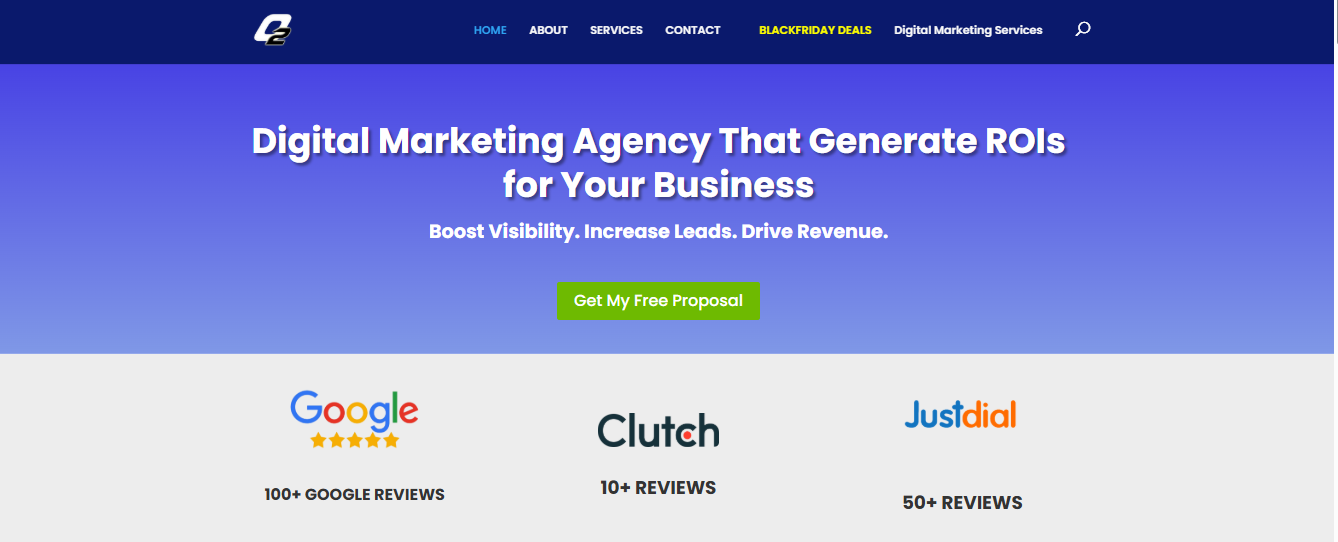
OXYGEN
Oxygenites is a leading web design and digital marketing company with over 13 years of experience.
Oxygenites provides a full range of services, including website design and development, search engine optimization (SEO), social media marketing, pay-per-click (PPC) advertising, content writing, video production, reputation management, conversion management, and Amazon marketing.
Their holistic approach ensures every website is visually strong and optimized for traffic, engagement, and lead generation.
Oxygenites stands out for its focus on delivering measurable business outcomes. By combining creative design, technical expertise, and data-driven digital marketing strategies, the company helps brands strengthen their online presence and achieve consistent growth.
This commitment to quality and performance has made Oxygenites a trusted name among top web design companies in Hyderabad
Contact details
Phone: 9885346295
Email: [email protected]
Website: https://oxygenites.com/
DigitalZap
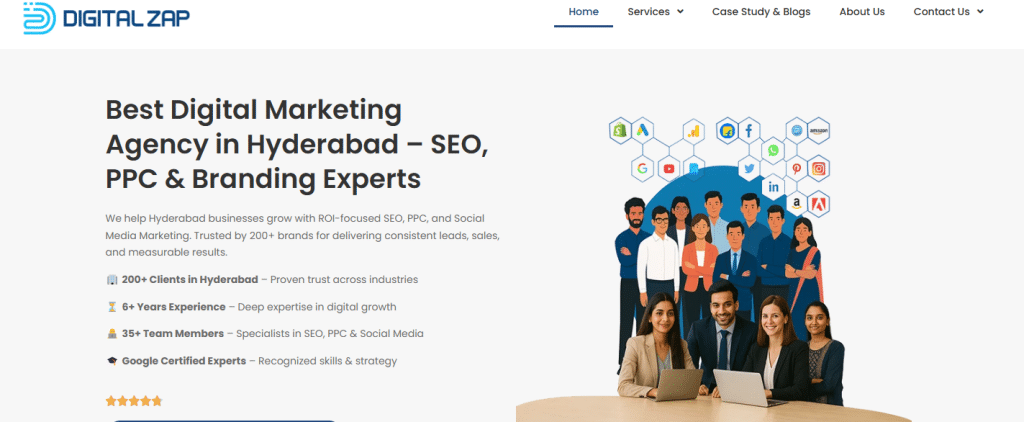
DigitalZap is a leading company in Hyderabad offering professional web design services to help businesses build strong and visually appealing online platforms.
The company provides website designing and development services focused on creating user-friendly, responsive, and business-oriented websites that enhance brand presence.
Along with web designing, DigitalZap also offers search engine marketing, marketplace marketing, app marketing, and branding services in Hyderabad, helping businesses strengthen their identity and reach their target audience effectively.
Their integrated approach ensures businesses have a well-designed website supported by strategic marketing and branding solutions for overall digital growth.
Contact details
Phone: 7331122663
Email: [email protected]
Website: https://digitalzap.in/
Nexonweb
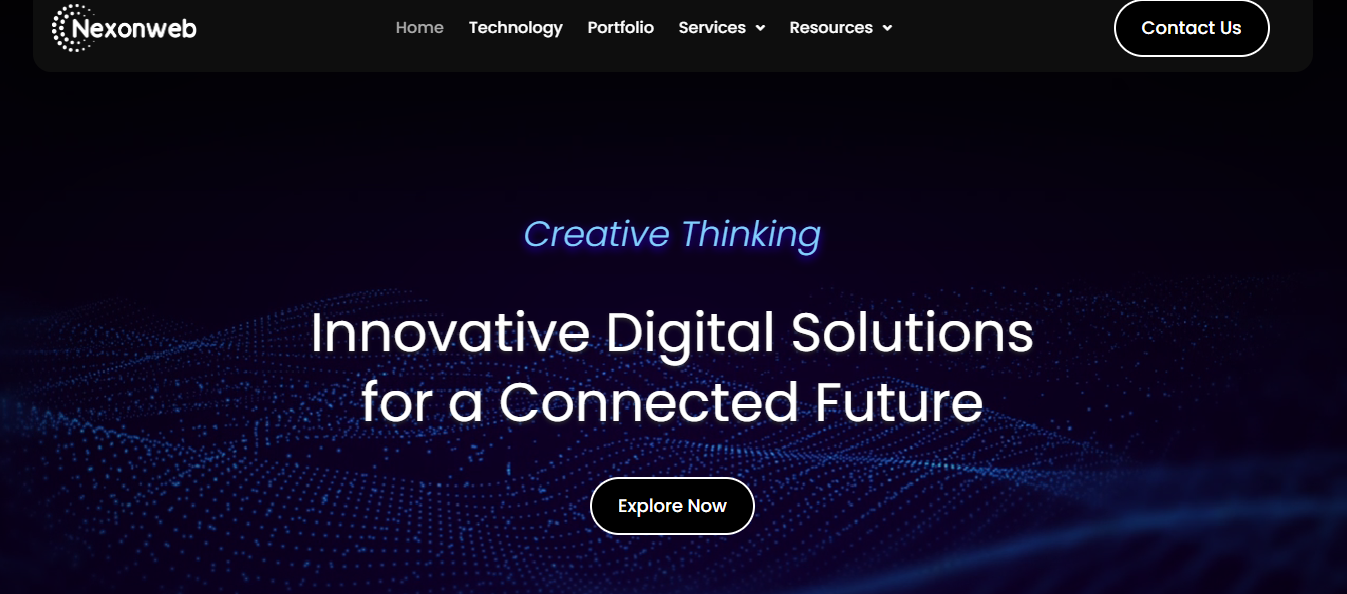
Nexonweb
Nexonweb is a technology-driven company that delivers a broad range of digital and development solutions to support modern business needs.
The company provides web and mobile app development and offshore development to help organizations build scalable and reliable digital platforms.
Its expertise also includes AI and ML development, IoT development, and blockchain development, enabling businesses to adopt advanced technologies.
Nexonweb also offers e-commerce solutions and mobile app development to create seamless digital experiences across devices. The company provides digital marketing services to support online visibility and business growth through strategic digital initiatives.
Contact details
Phone: +91-9063 630795
Email: [email protected]
Website: https://nexonweb.com/
Conclusion
Hyderabad has become a leading destination for web designing and digital marketing services, offering businesses access to skilled professionals, innovative technology, and cost-effective solutions.
From website design and development to SEO, social media marketing, PPC, content creation, and conversion optimization, web design companies in Hyderabad provide end-to-end services that help brands build a strong online presence.
Whether you are a startup launching your first website or an established business aiming to enhance digital performance, choosing the right web design company in Hyderabad can drive long-term growth and measurable results.
With their focus on user experience, search visibility, and data-driven strategies, these agencies play a vital role in helping businesses stay competitive in today’s digital landscape.
FAQS
1. What services do web design companies in Hyderabad offer?
Most web design companies in Hyderabad offer website design and development, search engine optimization (SEO), social media marketing, pay-per-click (PPC) advertising, content writing, video production, reputation management, conversion optimization, and Amazon marketing services.
2. Do web design companies in Hyderabad also provide digital marketing
services?
Yes, many web design companies in Hyderabad provide complete digital marketing services, including SEO, social media marketing, PPC campaigns, content marketing, and online reputation management to help businesses grow online.
3. How long does it take to design and develop a website?
The timeline depends on the scope of the project. A basic website may take 2–4 weeks, while advanced or eCommerce websites can take 6–8 weeks or longer, depending on design and development requirements.
4. Do web design companies help with conversion optimization?
Yes, conversion management is a key service offered by many agencies. This includes improving website layout, call-to-action placement, page speed, and user journey to increase leads and sales.
5. How do I choose the best web design company in Hyderabad?
To choose the best company, review their portfolio, services offered, client testimonials, industry experience, pricing transparency, and ability to provide end-to-end digital marketing solutions.

by Shashikanth Heerekar | Jun 4, 2025 | Digital Marketing
Discover what digital marketing is, explore types like SEO and PPC, learn benefits for small businesses, and get started with easy steps. Read more now!
What is Digital Marketing?
Digital marketing is the way of promoting your business or product using the internet and digital tools. It is different from old-style marketing, like posters or newspapers. In simple words, digital and marketing go together when you use online ways to talk to people about your brand.
Now, digital marketing is very popular because most people are using phones, websites, and social media. So, using digital marketing helps a business grow fast and reach many people. This is why many companies use marketing and digital marketing together to get good results.
Types of Digital Marketing
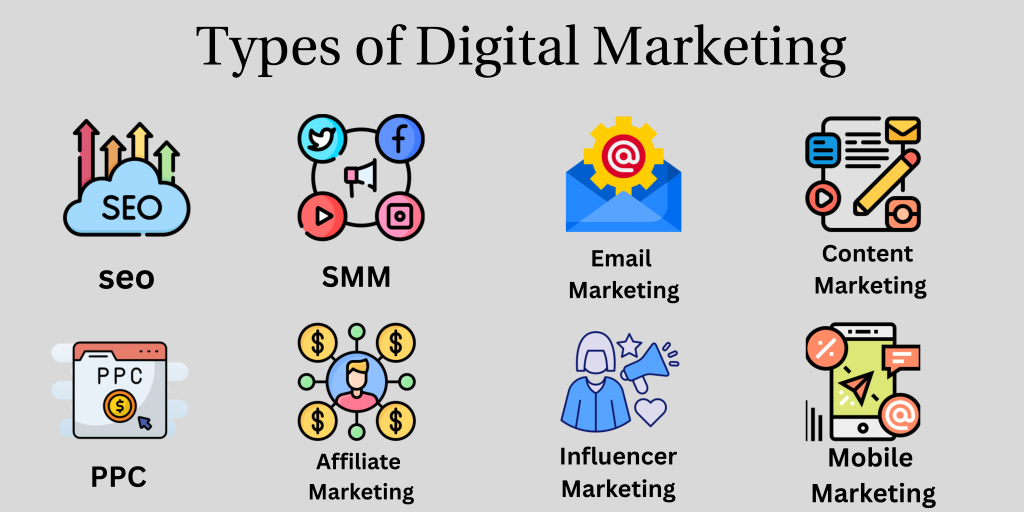
Search Engine Optimization (SEO)
Digital marketing includes SEO, which makes your website rank higher on Google. When someone searches for something, SEO makes sure your website shows up. This is an important digital marketing strategy because people usually click the first result. SEO is like a map that brings people to your website. It is a very important part of internet marketing and online business marketing.
Social Media Marketing (SMM)
Social media marketing is using Facebook, Instagram, YouTube, and other apps to show your products. This is one of the most used digital marketing strategies. Many companies use digital and online marketing on these platforms. With the help of online internet marketing, you can talk to people directly. It is a fun way to connect with users and tell them about your business.
Email Marketing
Email marketing is sending emails to customers. These emails can be about new products, offers, or news. It is part of the digital marketing process. Digital marketing and email marketing work well together. Email marketing helps you keep in touch with old customers and get new ones too. This is a good example of digital marketing.
Content Marketing
Content marketing is about writing helpful things like blog posts, videos, or images. It is a very smart digital strategy for marketing. This is because people love reading useful stuff. For example, if someone reads a blog about shoes, they may end up buying a pair. Content is so crucial to digital strategy and marketing.
Pay-Per-Click (PPC) Advertising
PPC means paying money for every click you get on your ad.When someone clicks on your advertisement on Facebook or Google, you are charged. This is used in digital marketing campaigns. It brings fast traffic to your website. PPC is a part of online marketing and internet marketing. It helps when you want fast results.
Affiliate Marketing
Affiliate marketing is when someone else sells your product and you give them a small amount of money. Many websites use this internet marketing strategy. This digital marketing strategy helps both the business and the person selling.
Influencer Marketing
Influencers are people who have many followers on Instagram or YouTube. In this digital and internet marketing method, you ask them to promote your brand. It is very effective for new products. Influencers help companies do digital promotion strategies easily.
Mobile Marketing
Mobile marketing is when you use phones to send messages, ads, or push notifications. It is part of online marketing strategy. Many people use phones, so mobile marketing is growing in the digital marketing industry. This is a smart online business marketing strategy.
How Digital Marketing Works
Digital marketing works in steps. First, you create content or ads. Then, you choose where to show them (Google, Instagram, email). People click and visit your website. Then they may buy or contact you. Digital marketing as a whole makes use of tools like emails, PPC, and SEO. The digital marketing process is simple but needs good planning. It is used in digital marketing and sales too.
Note: Digital marketing means using internet tools to help your business get noticed and grow. The digital marketing strategy definition is simple: plan + platform + message = result.
Benefits of Digital Marketing
Digital marketing gives many benefits. First, it is cheap. You can promote your brand with less money. Second, you can reach people all over the world. Third, you can see how many people saw your ad and clicked. That means you can check what works and what doesn’t. This is very helpful for digital marketing in the United States. Digital marketing USA companies use it daily.
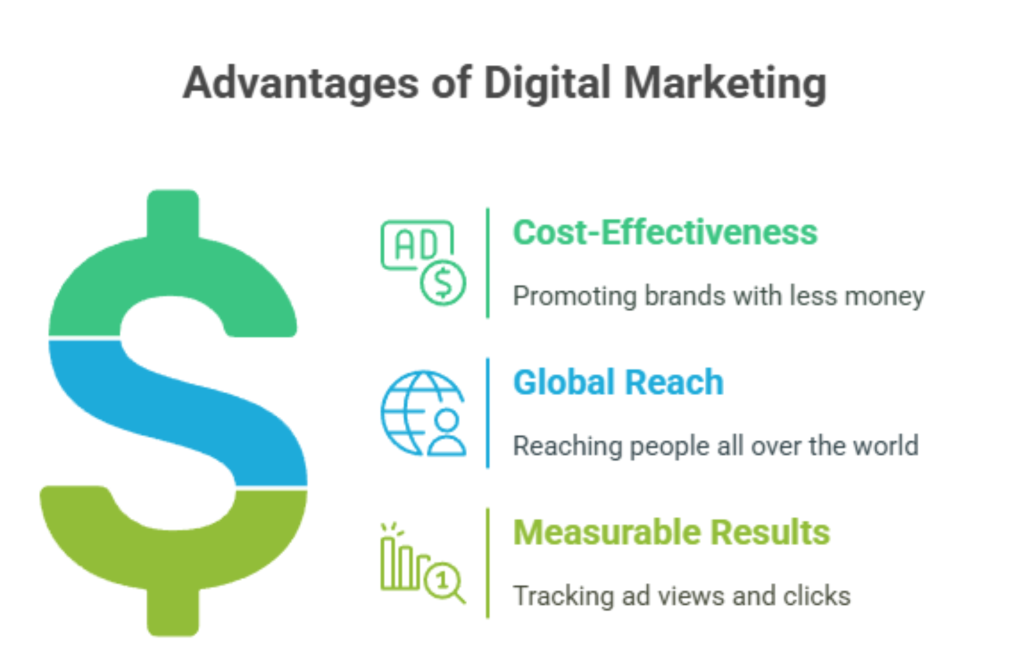
Digital Marketing for Small Businesses
Small businesses can use local SEO, social media, and Google My Business. This helps them get customers nearby. Digital marketing for businesses gives them a chance to compete with big brands. Online marketing for businesses helps them grow slowly. For example, a bakery can use Instagram to show cake photos and get new orders. This is how digital marketing helps small shops.
Note: Even if you have a small shop, you can use digital marketing and online marketing to grow your sales.
Common Digital Marketing Strategies
Some good strategies are using SEO and content marketing together. Many companies do email marketing and social media at the same time. Some use retargeting ads. That means they show the ad again to people who visited their website. These are parts of a marketing strategy, digital and online marketing advice. A good digital strategy for marketing helps you get more customers.
Challenges in Digital Marketing
There is a lot of competition. Many businesses are using the same digital marketing strategy for business. Also, websites like Google and Facebook change rules. You must keep learning. Understanding digital marketing helps you stay up to date. Internet marketing business changes quickly. So you must be ready. Even the best digital marketers organization keep learning new things.
How to Get Started in Digital Marketing
You can watch free videos, read articles about digital marketing, or join a course. Create a blog or Instagram account and begin practising. Try learning SEO, email marketing, and content creation. Many people start with small freelance jobs. Understanding marketing is easy if you take one step at a time.
Note: To do online marketing for business, start small. Pick one method, practice it, and then learn more.
Conclusion
So, what is digital marketing? It is a way to promote your business using the internet. From SEO to email to social media, digital marketing helps you reach more people. Every company today needs digital and marketing help. The digital marketing concept is simple but powerful. Even if you are just starting, digital marketing is for you. Whether you are in the US or anywhere in the world, online marketing can help your business grow.
FAQs
Q: What is digital marketing?
The practice of advertising goods or services online is known as digital marketing.It uses tools like websites, social media, emails, and search engines. This helps businesses reach more people and grow faster.
Q: How does digital marketing work?
It works by creating online content or ads and showing them on platforms like Google or Instagram. When people click, they visit your site and may buy or contact you. This step-by-step method brings traffic and sales.
Q: What are the main types of digital marketing?
The main types include SEO, PPC, content marketing, email marketing, and social media marketing. Each type helps attract different kinds of customers. Using them together improves your chances of success.
Q: What makes digital marketing crucial for small companies?
It’s affordable and helps small businesses reach more people online without spending too much. Local SEO and social media can bring nearby customers. This gives small shops a chance to grow and compete with big brands.
Q: What are the benefits of digital marketing?
Digital marketing is cost-effective, gives fast results, and allows you to track performance. You can reach a global audience from your phone or laptop. It helps you improve campaigns and get better returns.
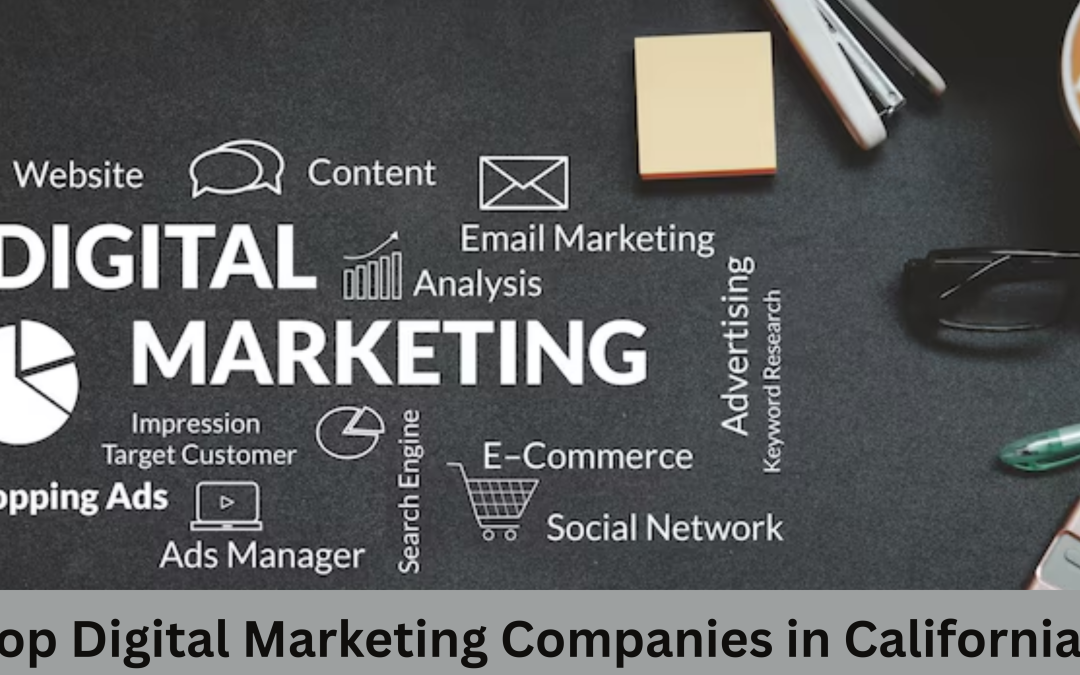
by Shashikanth Heerekar | May 17, 2025 | All Things about Marketing, SEO News
Explore top digital marketing services in California, including SEO, SMM, PPC, and content marketing from expert agencies in Los Angeles and San Diego.
Introduction: Understanding the Landscape of Digital Marketing in California
California is become a center for digital transformation and innovation. From Los Angeles to San Diego, businesses are embracing digital marketing strategies to stay competitive. As a business owner or marketing professional, you may have searched for terms like “marketing agencies near me” or “top digital marketing agencies in California” to find the best fit for your company. The Golden State is home to some of the most creative and data-driven digital marketing firms in the world.
With the rise of social media, content marketing, SEO, PPC, and branding, businesses in California need a comprehensive digital marketing strategy. Whether you are looking for a local marketing company in San Diego or a full-service digital marketing firm in Los Angeles, California offers endless possibilities.
A Summary of California’s Leading Digital Marketing Firms
When it comes to choosing the best digital marketing agency in California, several top names come to mind. Companies like those found on the list of “top 10 digital marketing agencies in Los Angeles” and “top advertising agencies in San Diego” are known for their innovation and results.
You’ll find agencies like:
- A leading digital marketing firm in San Diego known for its ROI-driven strategies.
- An award-winning social media agency in San Diego that helps brands go viral.
- A well-established marketing agency in Los Angeles that dominates search engine marketing.
These firms are well-known for providing branding, email marketing, PPC, SEO, and content production services.From top California digital marketing agencies to public relations firms in San Diego, businesses have a wide array of partners to choose from.
Best Digital Marketing Services Provided by California Agencies
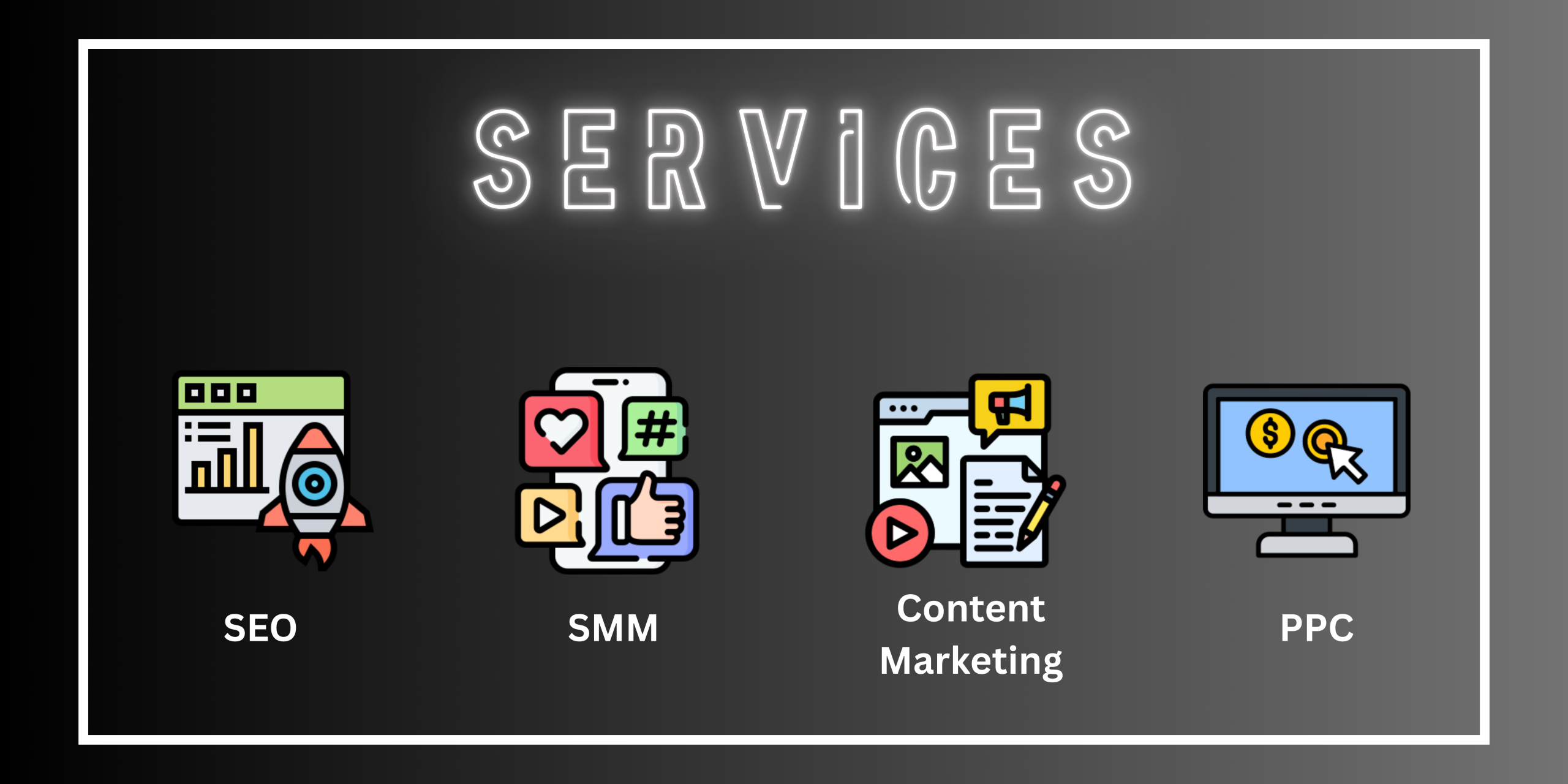
Search Engine Optimization (SEO)
Many digital marketing agencies in California offer expert SEO services to help businesses rank higher on search engines. From keyword research and on-page optimization to link building and technical SEO audits, Californian firms ensure your website appears on Google’s first page. Whether it’s a Los Angeles SEO company or a San Diego SEO firm, their goal is to drive organic traffic and improve visibility.
Social Media Marketing (SMM)
Social media agencies in California provide complete SMM services, including content creation, audience targeting, paid ads, and analytics. Platforms like Facebook, Instagram, LinkedIn, and Twitter are used to increase brand awareness and engagement. Whether you’re working with a social media marketing agency in San Diego or a Los Angeles digital agency, they tailor strategies to suit your business goals.
Content Marketing
Content marketing firms in California specialise in creating blogs, videos, infographics, and web copy that attract, engage, and convert audiences. These agencies use storytelling, SEO-driven content, and branded materials to build trust and authority. From a content writing agency in Los Angeles to a marketing company near me, you can expect customized content plans that align with your niche.
Pay-Per-Click (PPC) Campaigns
Top PPC agencies in California manage Google Ads, Bing Ads, and social media paid campaigns to get instant traffic and leads. They optimise ad copy, bids, and landing pages to ensure high ROI. Whether you hire a San Diego advertising company or a performance marketing agency in LA, they help you target the right audience and control ad spend effectively.
Evaluating the Success Metrics of Digital Marketing Agencies
ROI and Lead Generation
For any digital marketing agency in California, the ability to deliver ROI and generate quality leads is a top priority. Whether you’re hiring an internet marketing company in San Diego or a Los Angeles digital marketing agency, ask if they can show real growth in conversions, traffic, and sales. Look for data-backed performance like cost-per-lead improvements or revenue uplift from paid ads and SEO efforts.
Client Case Studies
Reputable California marketing firms often showcase detailed case studies. These real-life examples reveal how they solve problems and deliver measurable outcomes. Whether it’s a social media agency in San Diego or a content marketing agency in Los Angeles, their case studies should highlight strategies, tools used, and end results, like a 200% traffic boost or increased brand visibility.
Search Engine Rankings
If an agency claims to be the best, they should rank for high-intent keywords like “top digital marketing agency California” or “best SEO agency in Los Angeles”. Their SEO skills are demonstrated by a strong organic presence. Agencies not visible on the first page might not be the right fit for your business.
Client Retention Rates
The best digital marketing firms in California often maintain long-term relationships. Consistent performance and client satisfaction are indicated by a high retention rate. It also shows they provide ongoing value instead of just one-time campaigns. Before hiring, ask how long their average client stays with them.
Industry Reputation
Check if the agency is featured in directories like top marketing agencies US, advertising firms in San Diego, or digital marketing companies in Los Angeles. Peer recognition and industry trust are frequently associated with a solid reputation. Also, see if they publish KPIs, awards, or certifications on their website.
Note: Agencies like internet marketing agency San Diego or advertising firms San Diego often publish their KPIs and case studies online—always ask to review them.
How to Pick the Best Digital Marketing Firm for Your Company
Start by Defining Your Marketing Goals
Before searching for a digital marketing partner, it’s important to first understand what you want to achieve. Whether your goal is to increase website traffic, generate leads, drive sales, or improve brand visibility, clarity is key. This will help you filter options based on what each agency specializes in—some focus on performance marketing, while others excel at branding or content strategy.
Explore Local and Specialised Agencies
Once your goals are set, consider what type of agency fits your business. If you prefer hands-on communication and local expertise, search for a local marketing company near me. For businesses that need a complete suite of services, a top digital marketing agency near me might be the better fit. If your needs are industry-specific, like healthcare or SaaS, you should consider specialist marketing agencies that offer niche experience.
Check Reviews and Client Testimonials
Before signing with any agency, always do a credibility check. Go through reviews of marketing services near me on platforms like Google and Clutch. Positive feedback from past clients gives insight into the agency’s performance, communication, and professionalism. It’s also useful to see if they’ve worked with businesses similar to yours.
Request Consultations and Strategy Previews
Once you shortlist a few agencies, book consultation calls with digital marketing companies in Los Angeles or marketing firms in San Diego. During these sessions, ask them to share sample strategies, campaign timelines, and expected outcomes. A good agency will be transparent about its process and confident in its approach.
Evaluate Their Tools, Team, and Technology
A professional agency will rely on the latest tools like AI-powered analytics, automation software, and real-time dashboards to deliver results. Take time to learn about their internal team, skill sets, and project management workflow. The combination of the right tools and experienced marketers can make a big difference in campaign performance.
Case Studies: Success Stories from California’s Digital Marketing Powerhouses
Case Study 1: San Diego Retail Brand
A local fashion retailer partnered with a San Diego digital marketing company to improve their online visibility. By leveraging SEO, PPC, and social media, they increased their monthly revenue by 200% in six months.
Case Study 2: Los Angeles SaaS Startup
This startup teamed up with a Los Angeles internet marketing agency for lead generation. Through targeted email marketing and landing page optimisation, the startup reduced its customer acquisition cost by 40%.
Case Study 3: Fitness Brand in Orange County
A well-known fitness company used a California digital agency to scale their e-commerce. They utilized influencer marketing and Google Ads, leading to a 5x return on ad spend.
Note: You can find similar case studies on websites of top digital marketing firms and advertising agencies in Southern California.
Conclusion: Making Informed Decisions in Selecting a Digital Marketing Partner
Whether you’re looking for a local ad agency near me or one of the best marketing agencies in California, the key is to align with an agency that understands your vision. Use search queries like “top marketing agency near me” or “top advertising agency in California” to explore your options.
From San Diego advertising agencies to email marketing companies, Los Angeles, California, offers a wealth of top-tier partners. By focusing on your goals and researching, you’ll find a marketing agency in California that fits perfectly with your business.
Reminder: Always ask for a strategy presentation, references, and performance data before you sign a contract with any digital marketing company in California or a California marketing firm. Choosing wisely can make all the difference in your online growth journey.
Frequently Asked Questions
Q1. Which digital marketing services are most well-liked in California?
PPC advertising, content marketing, social media marketing (SMM), and SEO are the most sought-after digital marketing services in California. These services help businesses improve online visibility, drive traffic, and increase revenue.
Q2. How can SEO services from California agencies help my business?
SEO services from California firms can boost your website’s ranking on search engines like Google. By targeting the right keywords and optimising your site, you drive organic traffic and improve lead generation.
Q3. Do Californian marketing agencies offer customised social media strategies?
Yes, leading agencies in Los Angeles and San Diego design social media strategies tailored to each business. They focus on audience engagement, content planning, and platform-specific marketing to increase brand visibility.
Q4. Is PPC advertising effective for small businesses in California?
PPC services from California agencies are ideal for small businesses seeking quick results. With strategic ad placement and budget control, PPC helps generate targeted leads and boosts sales efficiently.
Q5. Why is content marketing important for online success?
Building trust, educating your audience, and bolstering your SEO approach are all accomplished through content marketing. Agencies create blog posts, videos, and infographics that attract traffic and convert readers into loyal customers.
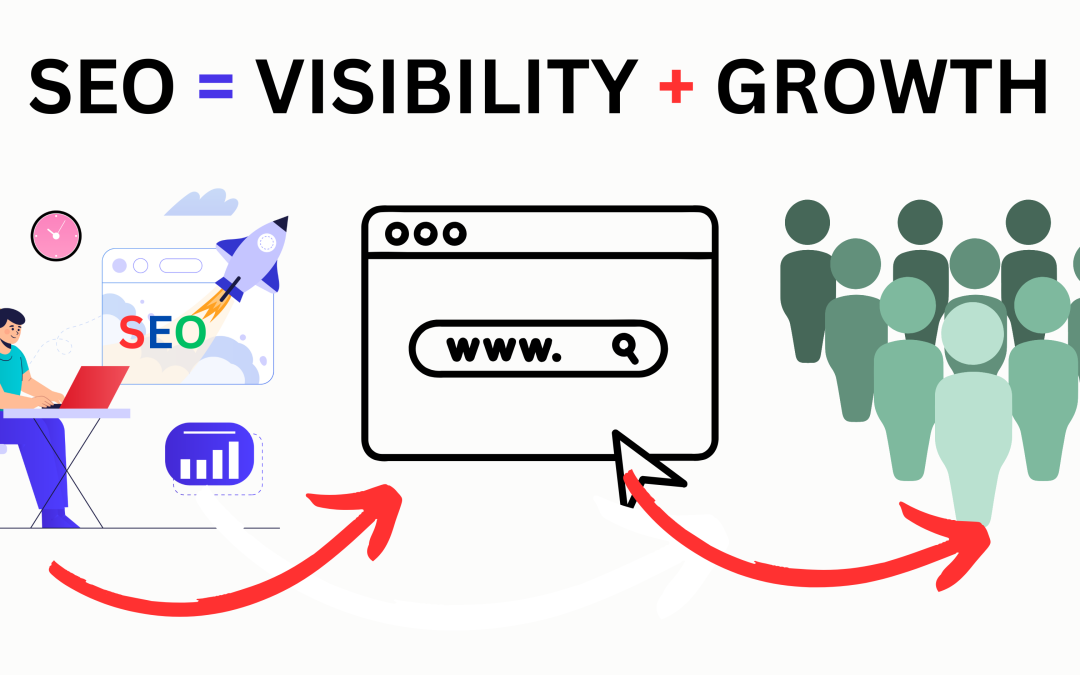
by Shashikanth Heerekar | May 6, 2025 | All Things about Marketing, SEO News, Technology
What Is SEO? Discover how SEO helps websites rank on Google. Here are easy tips for beginners to understand and apply SEO fast! Start learning now!
What is SEO (Search Engine Optimization)?
Search Engine Optimization, or SEO, is a method of improving a website’s visibility in search engine results pages (SERPs). It involves techniques and creative strategies to improve rankings, attract organic traffic, and increase the quality and quantity of visitors.
In other words, SEO services is also about increasing the standard and total website traffic. As you improve your position in search engines, you’ll likely get more visitors who may be engaged in your website, its products, or its content.
For the best explanation, we can use a real example. For instance, if you search for the term ‘best AC service providers’ on Google, Google will show you the top-ranking website for your keyword. Google shows these results for free, and the number of visitors coming through this is called organic traffic.
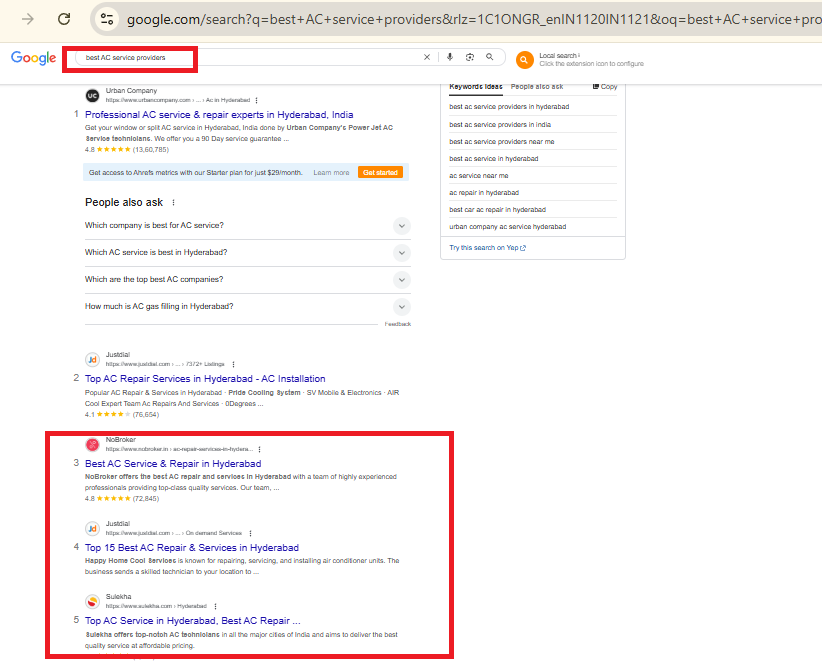
Why is SEO Important?
Catering to a Huge Audience
Most online approaches begin with a search engine. Ranking high means visibility in front of a wide, global audience actively searching for your products or services.
Low Cost of Implementation
Compared to paid advertising, SEO is cost-effective in the long run. You pay with time and effort upfront, but you can enjoy consistent traffic once you rank.
Staying Ahead of the Competition
Your competitors are investing in SEO. If you don’t, you’re handing them an advantage. SEO helps you stay relevant and ahead in a competitive online landscape.
Enhance User Experience
Good SEO practices improve user experience. You can please Google and your visitors by offering fast load speeds, mobile optimization, and easy navigation.
Builds Trust and Credibility
Sites that rank well are considered more trustworthy by users. Authority backlinks, quality content, and user-friendly design contribute to your reputation.
Data and Analysis
SEO provides valuable insight into user behaviour through tools like Google Analytics, Search Console, and Heatmaps.
How Does a Search Engine Work?
Search engine tools like Ecosia, Bing, StartPage, Google and DuckDuckGo are important systems that help users find accurate information quickly with accuracy. They follow a multi-step process that includes crawling, indexing, and ranking. Let’s break it down:
Crawling
Crawling is the first step in the process. Search engines send out automated bots known as crawlers or spiders to discover content across the web. These bots move from one page to another via links, collecting information such as:
- Page titles
- Meta tags
- Image alt texts
- Content structure
- Internal and external links
Search engines start with a known list of URLs (called a seed list) and, crawl those pages, then follow hyperlinks on those pages to discover new content. Crawling helps search engines discover which websites exist and what they contain.
✅ Example: Googlebot is Google’s main crawler. It continuously explores the internet, discovering new content and re-crawling updated pages. In the below as you can see, google has crawled and index your post.

Indexing
Once the content is crawled, it needs to be understood and stored. This process is called indexing. The data collected by crawlers is organized and added to the search engine’s massive index — essentially a digital library of all known web pages.
During indexing, search engines analyze:
- Page content and topic
- Keywords and keyword context
- The freshness of the content
- Multimedia content like images or videos
- Page structure (HTML, headings, schema, etc.)
Search engines also use semantic indexing, which helps them understand the exact keyword and its context and intent.
⚠️ Note: If your page is not indexed, it won’t appear in search results — even if it’s well-designed or keyword-optimized. In the below image page is not index.
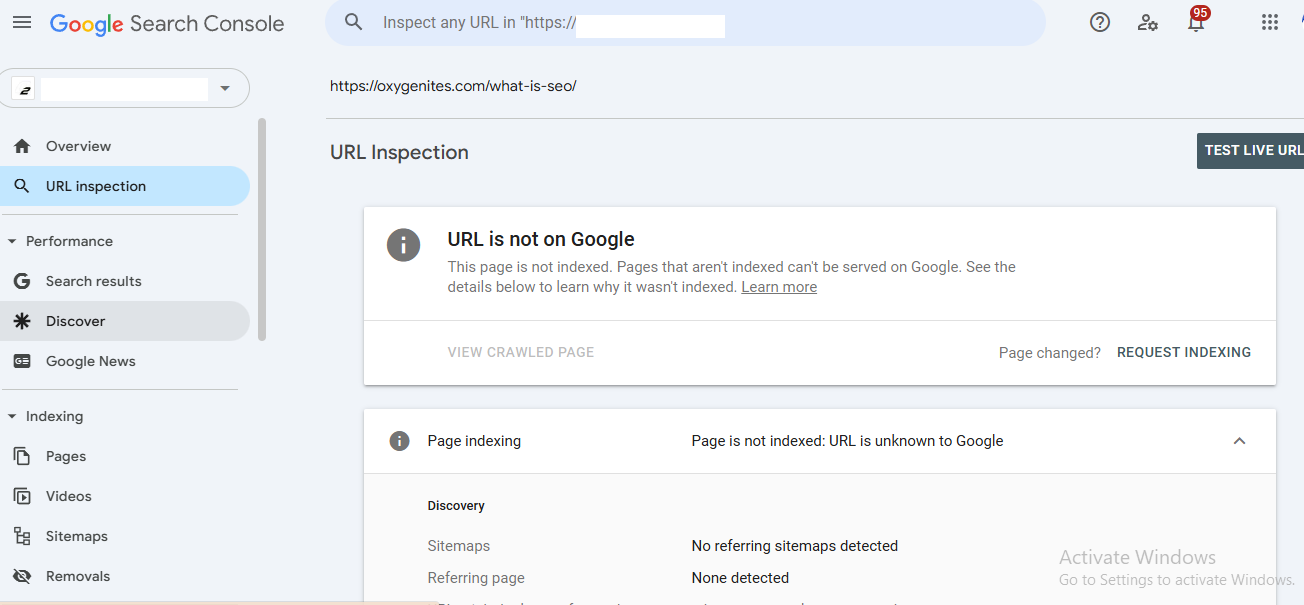
Ranking
When a user search a query into a search engine, it searches its index to find the most relevant pages. This is where the ranking algorithm comes into play.
The algorithm uses hundreds of ranking signals (Google has over 200) to evaluate and sort results. Tops of the most important ranking factors include:
- Keyword relevance
- Page authority (backlinks)
- Mobile-friendliness
- Page load speed
- Secure connection (HTTPS)
- User engagement signals (click-through rates, dwell time)
- Content quality and originality
Search engines try to match the user intent (informational, navigational, or transactional) with the most helpful and trustworthy pages. The goal is to show the best possible answer at the top of the search results.
How Do Search Engines Find Your Pages?
This tool helps you send a request to Google to crawl your website. You can also submit sitemaps for your site and monitor the number of submitted pages added to Google’s index and other details.
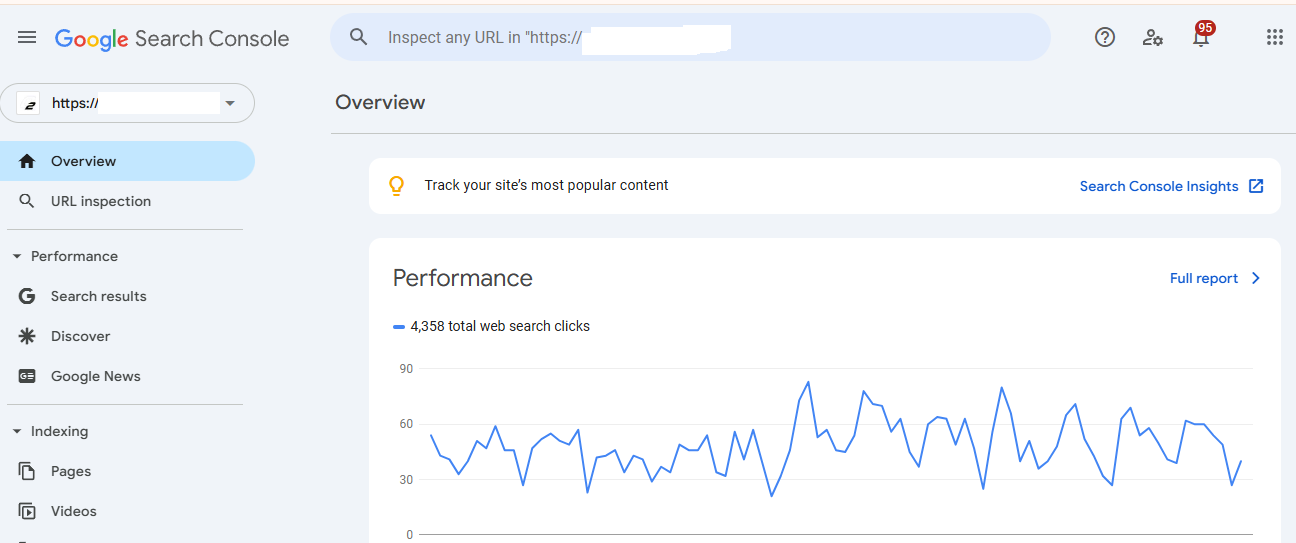
Why Sites Don’t Show Up in Search Results?
- Noindex tag present
- Poor content quality
- Blocked by robots.txt
- Lack of backlinks
- Penalty from algorithm updates
What is the Search Engine Algorithm?
Search engines use algorithms to decide the most relevant results for a query.
i. Analyze User Query
Search engines try to explain the intent behind a search query (informational, transactional, or navigational).
ii. Finding Matching Pages
The engine matches the query with indexed pages based on keywords, relevance, and authority.
Why Search Engines Sometimes Display Faulty/No Results?
This happens when the content doesn’t match user intent, is poorly optimized, or lacks authority.
How SEO Works?
SEO works by optimizing various website elements so search engines can explain their relevance and value to user queries. It starts with identifying what people are searching for—using keyword research—and then tailoring your website’s content, structure, and technical setup to target those search terms. By doing this, search engines are more likely to rank your pages higher, bringing in more organic traffic.
For example, run a bakery in Delhi and optimize your site with keywords like “best cakes in Delhi.“ Add quality content about your products, fast loading speed and mobile-friendliness. Google will find your site more valuable for people searching those terms. Over time, you may appear on the first page, attracting customers without paying for ads.
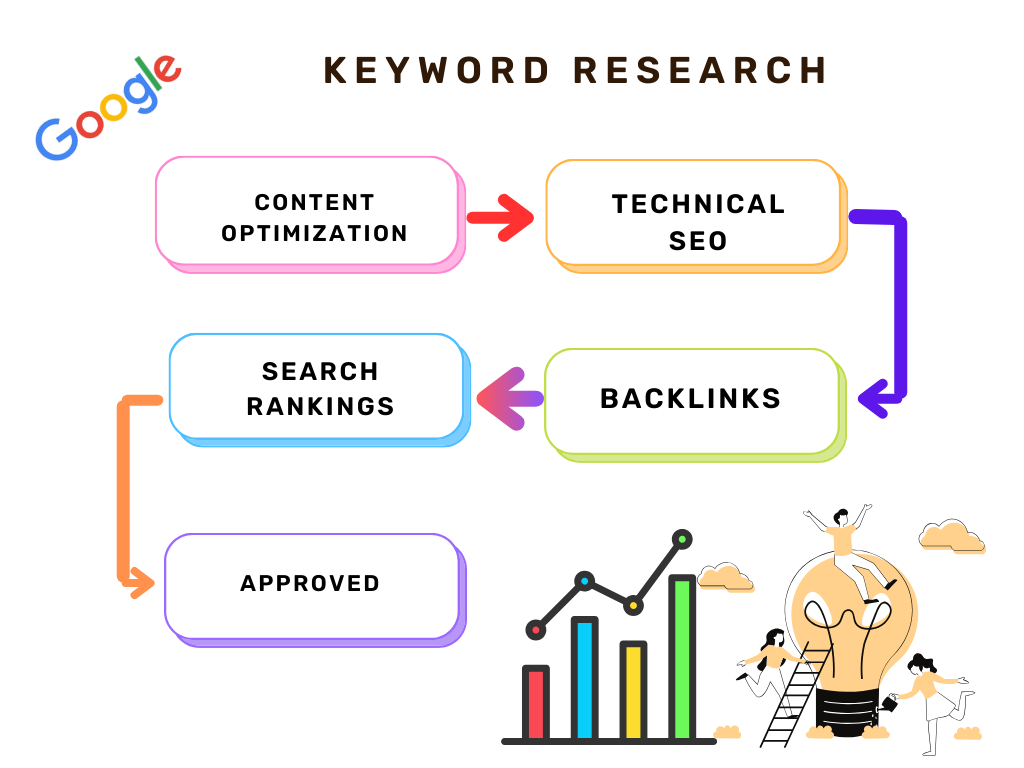
What are the Major Types of SEO?
On-Page SEO
Why is On-Page SEO Important?
It verifies that search engines recognize the content of your pages and rank them appropriately.
What are the Most Important On-Page Ranking Factors?
i) Title Tag Optimization
Use clear, concise titles with the primary keyword near the beginning.
ii) Meta Keywords and Meta Descriptions
Though meta keywords are outdated, a well-written meta description can increase CTR.
iii) Heading Tags
Organize content using H1, H2, H3 and H4 tags appropriately.
iv) Image Optimization and Interactive Media
Use alt text and descriptive file names, and reduce image size.
v) Engaging Content
Content should be unique, relevant, and answer the searcher’s query.
vi) Internal & External Links
Use links to guide users and spread link equity.
vii) Handle Duplicate Content
Use canonical tags and avoid duplicate pages to ensure search engines rank the correct version.
2. Technical SEO
Why is Technical SEO Important?
It provides that search engines can crawl, index, and rank your site effectively.
Technical SEO Best Practices
i) Website Speed
Improve loading times using caching, compression, and fast servers.
ii) Mobile-Friendliness
Responsive design is now a ranking factor. Use Google’s Mobile-Friendly Test.
iii) Site Architecture
Structure your site with a clear hierarchy and use breadcrumb navigation.
iv) Security
Use HTTPS to encrypt data and increase trust.
v) Structured Data Markup
Use schema to enhance search appearance with rich snippets.
vi) Create an XML Sitemap
The below given is an example of XML Site map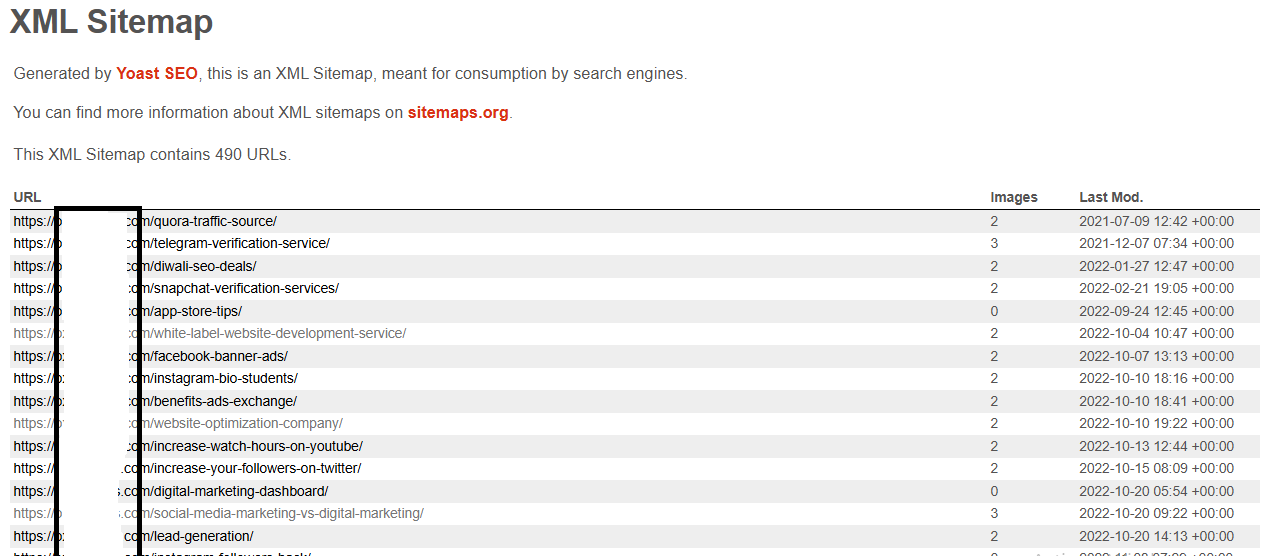 3. Off-Page SEO
3. Off-Page SEO
Why is Off-Page SEO Important?
It builds your site’s authority and trustworthiness.
Off-page Optimization Techniques
i) Quality Inbound Links
Get backlinks from sites with high domain authority(DA).
ii) Social Media Marketing
Share your content or blogs on social media platforms to increase visibility and backlinks.
iii) Content Marketing
Produce high-value blog posts, infographics, and videos.
iv) Localization and Citations
Ensure consistent business information across directories.
v) Email Marketing
Engage audiences and drive traffic to your optimized content.
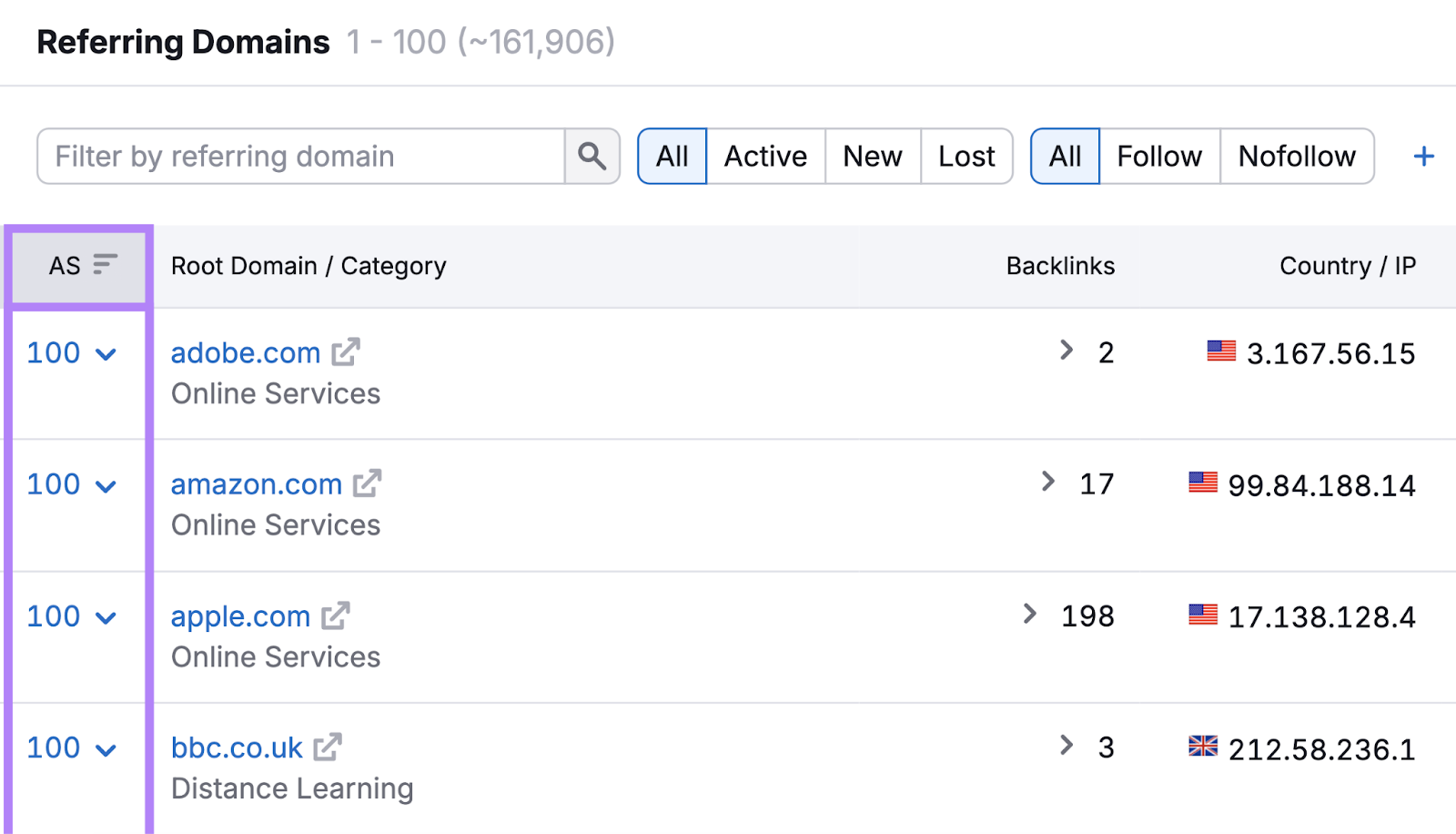
How do you do keyword research for SEO?
1. What is the role of Keyword research in SEO, and why does it play an important role?
Keyword research is one of the most important aspects of SEO because it directly impacts how well your content ranks on search engines. Acknowledging what your audience is searching for helps you create relevant and optimized content for those specific queries. By knowing the search intent that regular visitors are looking for, you can tailor your website’stciles, blogposts, and services pages to target those particular keywords.
It increases your organic traffic and ensures that the content you produce meets the needs and interests of your audience. For instance, if you’re running an online store that sells sneakers, performing keyword research can reveal terms like “best running shoes for flat feet“ or “affordable sneakers for men,“ which you can target in your content to increase visibility in search results and attract more customers.
The below is the example for top searches.

2. Brainstorming for Keywords
Brainstorming for keywords is the initial step in the keyword research process, and it involves thinking about your business, niche, and the potential questions your audience might have. Start by creating a list of broad topics related to your industry, products, or services. These could be things like “digital marketing,” “healthy eating,“ or “home improvement tips.“ Once you have a list of broad topics, you can break them down into more specific subtopics or long-tail keywords.
For example, from “digital marketing,“ you could narrow down to “SEO services,” “email marketing tips,“ or “social media strategies.“ This helps identify general and specific search intents that people might use when looking for solutions in your area of expertise.
3. What are some things to know before finding a suitable keyword? (Competitor’s Keywords Analysis)
It is important to find the most suitable keyword. It involves not only brainstorming but also analyzing your competition. By gathering your competitors’ keywords for which they are ranking, you can gain valuable insights into what works and which topics have significant search volume. Tools like Ahrefs, Semrush, and Moz allow you to analyze your competitors’ keyword strategies. You can enter their websites using these tools to see which keywords they rank for, how much traffic they’re receiving, and the difficulty level of ranking for these terms.
For example, if you find that your competitor’s blog is ranking for the keyword “best-running shoes for long-distance runners,” this could indicate high interest in this topic. You can use this information to target the same or similar keywords in your content, adjusting your approach to make it more compelling or detailed to improve your chances of outranking them.
Competitor analysis gives you a competitive edge and can highlight keyword opportunities that you might not have considered otherwise.
The below image shows you the competitor’s keywords which we can include in your article.

4. How to Choose the Best Keyword?
i) Long-tail Keywords:
Less competition and more targeted traffic.
ii) Latent-Semantic Indexing (LSI) Keywords:
Related terms that support the main keyword.
iii) Follow Recent Trends:
Stay updated using Google Trends.
iv) Location-Based Keywords:
Useful for local SEO (e.g., “plumber in Miami”).
5. Keyword Research Tools
i) Google Trends
ii) Google Keyword Planner
iii) Semrush
iv) Soovle
v) Ubersuggest
Emerging Trends in SEO in 2025
1. Artificial Intelligence in SEO
AI is transforming keyword research, content creation, and competitor analysis.
2. Google’s EEAT Factors
Experience, Expertise, Authoritativeness, and Trustworthiness matter more than ever.
3. Core Web Vitals for Enhanced Ranking
Focus on LCP, FID, and CLS for performance.
Quick Tips to Improve Core Web Vitals
- Use fast hosting
- Compress media
- Defer JavaScript
Practical Guide to Improving Your Website’s SEO in 2025
1. Using AI for SEO
i) AI-Powered Keyword Research
Use AI tools to uncover opportunities faster.
ii) Understanding Search Intent with AI
Analyze what users want to see.
iii) On-page Optimization with AI
Optimize content layout and structure using smart suggestions.
iv) Competitive Analysis
Track competitors’ moves in real-time.
v) Facilitating Content Creation
Generate outlines and FAQs and draft content using AI.
2. Doing SEO Yourself
- Use Google Search Console
- Follow on-page and technical SEO best result
- Build relationships for backlinks
Conclusion
SEO in 2025 requires a mixture of solid fundamentals, awareness of emerging trends, and smart implementation. You can secure your place in Google’s top ranking by aiming at valuable content, user experience, and your site’s technical health.
FAQs
Q1: How long does SEO take to show results?
A: Typically, it is 3–6 months, depending on competition and effort.
Q2: Is SEO better than PPC?
A: SEO brings long-term results, while PPC is immediate. Both have their place.
Q3: Can I do SEO without coding?
A: Yes, many SEO tasks can be completed without coding skills.
Q4: How often should I update SEO content?
A: Update every 3–6 months or when major algorithm updates occur.
Q5: What’s the best free SEO tool?
A: Google Search Console and Google Keyword Planner are excellent free tools.
Q6: What are the latest Google SEO trends in 2025?
A: In 2025, Google emphasizes EEAT (Experience, Expertise, Authoritativeness, Trustworthiness), Core Web Vitals, mobile optimization, and AI-generated helpful content. Following ethical white hat practices and optimizing user experience is crucial to maintaining or improving rankings in search results.

by Shashikanth Heerekar | Dec 25, 2024 | SEO News
Get accurate and relevant search results with iSearchFrom, your premier destination for localized search. Discover businesses, services, and information tailored to your location.
Introduction to iSearchForm
Search engine optimization (SEO) is the backbone of digital success for businesses and individuals. Understanding regional search engine behaviour has become vital with the increasing importance of localized strategies. This is where iSearchFrom proves to be a game-changer.
iSearchFrom is an online tool that lets users simulate Google searches from any location worldwide. It allows users to view search results as if they were physically located in their target market. This feature is particularly useful for marketers, businesses, and bloggers who want to customize their SEO strategies for specific audiences.
For example, search results for “best restaurants near me” will vary drastically depending on whether the search is conducted in New York, Paris, or Tokyo. Using iSearchFrom, you can see exactly how these results differ across locations and tailor your SEO strategy accordingly.
Whether a small business looking to attract local customers or a multinational company managing international campaigns, iSearchFrom provides the tools you need to succeed.
Why iSearchFrom is a Must-Have for Digital Marketers
iSearchFrom offers numerous advantages for businesses and marketers to improve their online visibility. Let’s explore the key benefits:
1. Localized Search Insights
iSearchFrom allows you to simulate searches from any region, giving you a clear view of localized search engine results pages (SERPs). This capability is invaluable for businesses targeting specific geographic markets, as it helps identify the keywords, trends, and content that resonate most with local audiences.
For example, a clothing brand in London planning to expand into Los Angeles can use iSearchFrom to analyze how their target audience searches for fashion-related terms in that region.
2. Enhanced Keyword Research
Keywords are the foundation of any successful SEO strategy. With iSearchFrom, you can discover high-performing keywords in specific locations. This feature is particularly useful for identifying region-specific search terms that might not appear in generic keyword research tools.
For instance, if your business operates in Australia, iSearchFrom can help you pinpoint which keywords rank higher in Melbourne than in Sydney, allowing you to refine your SEO strategy for each city.
3. Competitive Analysis
Understanding how competitors perform in different locations is key to staying ahead in the digital landscape. iSearchFrom enables you to monitor competitor rankings and strategies in specific regions. By identifying their strengths and weaknesses, you can develop more targeted and effective campaigns to outperform them.
4. Improved Ad Campaigns
If you’re running Google Ads, iSearchFrom can help you preview how your ads appear in different regions. This ensures your campaigns are optimized for your target audience, leading to better click-through rates and conversions.
5. Cost and Time Efficiency
Unlike other tools that use VPNs to simulate location-based searches, iSearchFrom integrates this feature directly into its platform. This eliminates the need for additional software, saving time and reducing costs.
Features of iSearchFrom
1. User-Friendly Interface
iSearchFrom is designed with simplicity in mind. Its intuitive dashboard ensures users of all experience levels can navigate the tool effortlessly. Beginners can quickly perform searches without technical knowledge, while experienced marketers can easily access advanced features.
2. Location-Based Search Simulation
iSearchFrom’siSearchFrom’s standout feature is its ability to replicate searches from specific locations. Whether targeting a global market or a local neighbourhood, this functionality provides actionable insights to optimize your SEO strategy.
3. Multi-Device Compatibility
iSearchFrom is compatible with desktops, laptops, smartphones, and tablets, ensuring seamless access across all devices. You can conduct research and analyze search results at the office or on the go without interruptions.
4.No VPN Required
Unlike other tools that require VPNs for location-based searches, iSearchFrom eliminates this extra step. Its built-in location simulation feature allows users to perform searches directly, saving time and simplifying the process.
5. Support for Multiple Languages
iSearchFrom offers support for businesses in various languages and targets multilingual audiences. This feature lets you analyze content performance in different linguistic contexts, helping you create tailored campaigns for diverse markets.
6. Accuracy and Reliability
iSearchFrom delivers precise and reliable search results, replicating Google’sGoogle’s output for your chosen location. This accuracy ensures your data is authentic and actionable, enabling informed decision-making.
7. Free and Premium Options
iSearchFrom caters to a wide range of users with its flexible pricing options. The free version is ideal for individuals and small businesses, while premium plans offer advanced features like detailed analytics and multi-user access.
How to Use iSearchFrom for SEO Optimization
Step 1: Select Your Target Location
Identify the geographic area you want to analyze. For example, if you plan to launch a new product or swgoh webstore in Dubai, use iSearchFrom to simulate searches from that region and understand local search behaviour.
Step 2: Enter Your Keywords
Input the keywords you want to research. iSearchFrom will provide insights into how these terms rank in your chosen location.
Step 3: Analyze the Results
Review the search engine results pages (SERPs) to identify opportunities for improvement. Look for trends, high-ranking keywords, and gaps in competitors ‘ strategies.
Step 4: Optimize Your Content
Use the insights gathered to update your website’s content. Incorporate region-specific keywords and adjust your messaging to align with local search trends.
Step 5: Monitor Competitors
Analyze your competitor’s performance in the target location. Identify areas where they are excelling and pinpoint opportunities to outperform them.
Step 6: Refine Ad Campaigns
Preview how your Google Ads appear in the target region and make necessary adjustments to improve their effectiveness.
Pricing Plans for iSearchFrom
Free Version
The free plan is perfect for individuals and small businesses starting with SEO. It offers basic features like location-based searches and keyword analysis.
Premium Plans
Premium plans cater to advanced users and include features like:
- Enhanced search simulations
- Comprehensive analytics
- Multi-user access
- Priority customer support
Custom Plans
Larger organizations can request custom plans tailored to their specific needs. These plans offer scalability and additional features to support complex SEO campaigns.
Conclusion
In today’s competitive digital environment, tools like iSearchFrom are indispensable for businesses and marketers aiming to optimize their SEO strategies. With its ability to simulate location-based searches, deliver accurate results, and provide actionable insights, iSearchFrom empowers users to make data-driven decisions.
Whether you’re a beginner exploring SEO or an experienced marketer managing global campaigns, iSearchFrom offers the tools and features you need to succeed. Start using iSearchFrom today and unlock your website’s full potential!
FAQS
1. What is iSearchFrom?
iSearchFrom is an online tool that lets users simulate Google searches from any location worldwide. It helps businesses and marketers analyze localized search results to optimize their SEO strategies effectively. This tool is valuable for tailoring digital campaigns and understanding audience behaviour in specific regions. Replicating searches from different locations provides a more accurate view of global search trends. iSearchFrom is an essential tool for businesses targeting multiple geographic markets.
2. How does iSearchFrom benefit businesses?
iSearchFrom provides insights into localized search trends, enabling businesses to optimize their content for specific regions. It improves keyword research, analyzes competitor performance, and refines SEO and ad campaigns. Saving time and costs ensures businesses stay ahead in their digital marketing strategies. With its precise results, iSearchFrom helps companies to make informed decisions for better ROI. The tool is a game-changer for companies looking to expand their reach and improve their SEO rankings.
3. Is iSearchFrom free to use?
Yes, iSearchFrom offers a free version with essential features and premium plans for advanced functionalities. While the free plan is ideal for basic needs, premium options provide in-depth analytics, bulk searches, and enhanced support. Businesses can choose a plan based on their requirements and budget. The free version is a great way to get started with the tool. Premium users enjoy priority customer support and exclusive features for more detailed insights.
4. Can I use iSearchFrom on mobile devices?
ISearchFrom is compatible with smartphones, tablets, laptops, and desktops. Its responsive design ensures smooth functionality across all devices, allowing users to conduct research anytime, anywhere. This flexibility makes it a convenient tool for professionals on the move. The mobile-friendly version provides the same accuracy and ease of use as the desktop version. You can access important insights whenever needed, whether in the office or on the go.
5. Do I need technical skills to use iSearchFrom?
No, iSearchFrom is user-friendly and suitable for beginners and experts alike. Its intuitive interface makes it easy to simulate searches and analyze results. With no coding or technical expertise required, anyone can use it effectively for SEO optimization. The tool offers clear instructions and guidance to help users navigate easily. Even those new to SEO can take advantage of its features without feeling overwhelmed.



















